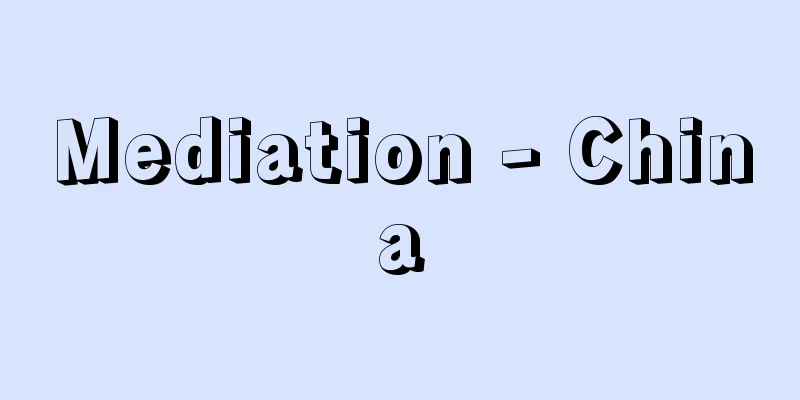Mediation - China

|
Generally, it refers to a third party making an effort to resolve a dispute between the parties. In corporate transactions, it also refers to making an effort to conclude a corporate transaction at the request of another company. In the latter case, merchants who do this as a business are called intermediaries. Intermediaries benefit by assisting corporate transactions and receiving remuneration, while companies can expand and streamline their own trading activities by using the intermediaries' credibility and sales networks. Regarding this type of intermediary business, the Commercial Code has provisions on commercial agents (Articles 27-31), middleman businesses (Articles 543-550), and wholesale businesses (Articles 551-558). [Kazuyuki Nagai] Mediation in international disputesThe Hague Convention for the Peaceful Settlement of International Disputes (1907) states that "The Contracting Parties agree that in case of serious clashes or disputes, before resorting to armed force, they shall, as far as circumstances permit, resort to the good offices or in-country mediation of one or more of their friendly Powers." Mediation (in-country mediation) is thus one of the means of peaceful settlement of disputes, in which a third party (one or more) at the request or consent of the disputing parties attempts to appease the ill feelings of the disputing parties by persuasion, to encourage them to compromise and to begin or resume negotiations, and furthermore to present suitable settlement conditions for adjusting the conflicting interests and claims of the disputing parties. Good offices are often confused with mediation, but the two are distinguished by the degree of intervention by a third party. In other words, mediation is distinguished from good offices in that the mediator himself does not just encourage the disputing parties to begin negotiations, but also presents conditions for resolving the dispute. In so doing, the mediator does not act as a judge, but merely as a friendly arbitrator. The terms of dispute settlement that he proposes are therefore purely advisory in nature and are not binding. A dispute is only resolved when the parties negotiate with the mediator and reach an agreement or agree to accept the mediator's terms of settlement. [Kou Minagawa] [Reference] | | | |Source: Shogakukan Encyclopedia Nipponica About Encyclopedia Nipponica Information | Legend |
|
一般には、紛争を生じている当事者に対して、第三者がその解決に尽力することをいう。また、企業取引において、他の企業からの依頼により、企業取引の成立に尽力することをいう。 後者の場合、それを営業として行う商人のことを仲介業者とよぶ。仲介業者は企業取引を補助して報酬を受けることで利益を有する一方、企業は仲介業者のもつ信用力や販売網を利用することで、自らの取引活動を拡大・合理化することができる。このような仲介業に関して、商法では代理商(27条~31条)、仲立(なかだち)営業(543条~550条)、問屋(といや)営業(551条~558条)について規定を置いている。 [永井和之] 国際紛争における仲介ハーグ国際紛争平和的処理条約(1907)は、「締約国ハ、重大ナル意見ノ衝突又ハ紛争ヲ生シタル場合ニ於(おい)テ、兵力ニ訴フルニ先(さきだ)チ、事情ノ許ス限リ其(そ)ノ交親国中ノ一国又ハ数国ノ周旋又ハ居中調停ニ依頼スルコトヲ約定ス」と定めている。仲介(居中調停)とは、このように紛争の平和的解決手段の一つであり、第三国(一国または数国)が紛争国の要請または同意により、説得によって当該紛争国の悪感情を融和し、互いに歩み寄って交渉を開始し、または再開するように努め、さらに進んで紛争国の対立する利害・主張を調整するのに適した解決条件を提示するものである。周旋はしばしば仲介と混同されるが、両者は第三国の介入の程度によって区別される。すなわち、仲介は、紛争国に交渉を始めるよう勧めるだけではなく、仲介者自身紛争を解決するための条件を提示することで周旋と区別される。そうするにあたって、仲介者は裁判官として行動するのではない。あくまで友誼(ゆうぎ)的調停者として行動するのである。したがってその提示する紛争解決条件はまったく勧告の性質を有するにとどまり、拘束力を有するものではない。紛争は、仲介により紛争国が交渉を行い、その結果合意に到達するか、または仲介者の解決条件を一致して受諾することによって初めて解決する。 [皆川 洸] [参照項目] | | | |出典 小学館 日本大百科全書(ニッポニカ)日本大百科全書(ニッポニカ)について 情報 | 凡例 |
<<: Commentary school - Chinese
Recommend
Filefish (skinned) - filefish (English spelling)
A marine fish of the filefish family in the order ...
The Record of Hisamichi Konoe
This is the diary of Konoe Hisamichi, a court nobl...
Stumpf - Carl Stumpf
German psychologist. Born near Würzburg, he loved...
European law - Ouhou
…Most of the calligraphy in Korea from Unified Si...
Kirishitan akame - Kirishitan akame
…Since 1613 (Keicho 18), the Edo Shogunate issued...
white-rumped munia
...A bird of the family Cephalidae in the order P...
Ceratium fusus (English spelling) Ceratium fusus
… Ceratium hirundinella grows in large numbers in...
Sylt (Island) (English spelling)
A small island in the northernmost part of Germany...
Old Country Man Tadajii - Just an Old Man
?-? A comic writer in the mid-Edo period. He is s...
Inten
(Abbreviation of "Japan Art Academy Exhibitio...
Prambanan - Prambanan (English spelling) Prambanan
A village located about 15km east of Yogyakarta, ...
Symmetry - Sosho
In biology, this refers to the division of an ani...
Information - joho (English) intelligence
It refers to knowledge that a nation, organization...
Katsuo Okazaki - Okazaki bonito
Born: July 10, 1897 in Kanagawa Died: October 10, ...
Ascothoracica
...About 30 species, including the blue-green wor...









